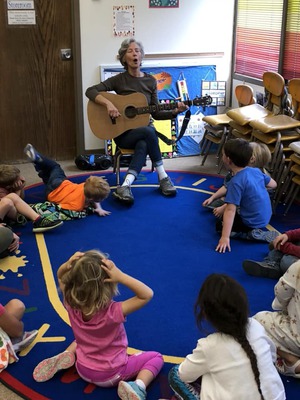Learning encouraged through exploration for CDC students

CHADRON – Since 1972, the Child Development Center Laboratory (CDC) at Chadron State College has encouraged students to learn by exploring their natural curiosities.
Accredited by the National Association for the Education of Young Children, the CDC strives to take advantage of teachable moments through play-based curriculum.
Dr. Kim Madsen, who directed the CDC from 1989 to 2013, describes the curriculum by saying play is a child’s work and work is a child’s play.
“Play-based curriculum focuses on providing inclusive environments for all children as they learn to be creative, independent, responsible and respectful of others and the materials they engage with through play,” Madsen said.
This type of curriculum lets children lead and, therefore, is flexible according to current CDC Director Lona Downs.
“We try to base the things that we do off their interests. When we have an opportunity that a child is excited about, then we are going to switch things up and go in their direction,” Downs said. “We are letting them lead the learning and we are here as a guide.”
The CDC also uses a project approach in which certain projects are ongoing, such as recycling paper and water bottles, or gardening and harvesting produce in the summer.
Monthly themes are based on holidays, seasons or other natural occurrences, however, student interests decide the learning activities. Recently, pumpkins were turned into boats and experimented with to sink because a student was interested in the Titanic.
Although exploring is encouraged in the indoor classroom areas, a big emphasis is placed on outside involvement and nature. The CDC aims to have any child in attendance for a 10-hour day outside for three hours.
“We go out in all weather because it is another learning opportunity. In the snow, we can build snowmen and work on motor skills with throwing snowballs against the wall. ” Downs said.
CDC’s outdoor area includes a Nature Explore Outdoor Learning Environment. CSC Grounds Supervisor and Horticulturist Lucinda Mays and staff have made improvements to the CDC’s outdoor area, including a play yard landscape with a horseshoe shaped track of turfgrass for racing, shrub cover for hiding and playing house, shade trees for cooling in summer, and safe and colorful flowers to mark the entrance.
These and the other additions of a music stage, digging areas, a greenhouse and garden, and jungle gyms are just some of the outdoor features children can explore during self-discovery time.
Available multiple times a day, self-discovery time provides students options to choose what they want to play with, how they want to play with it, and ask questions, according to Downs. In return, this time allows teachers to see what students are drawn to and how curriculum can be created.
Students may not know it, but these times are beneficial to their learning.
“All of our activities are play-based which helps the students learn because it is fun. Sometimes they don’t think they are learning, but they are learning a lot through activities that we are doing,” said Teaching Assistant Kate Chesterman, an Early Childhood Education major from Bertrand, Nebraska.
In relation to Election Day, students voted on their favorite pie, tallied the votes, and made the winning pie – pumpkin. Though focusing on the pie aspect, the children were actually practicing their counting skills.
Chesterman is one of approximately 15 CSC students from various majors who serve as teacher assistants. They join Downs to help fulfill exploratory learning and curiosity interests of the 35 enrolled children, ranging in ages from two to nine.
“We really strive to meet every child’s needs, no matter what that may be. Teachers all work together as a team to make sure that the curriculum we are providing gives time to get up and jump, getting the body moving. It allows them to do the self-discovery time, but it is also teaching them that there is a routine and they have rules to follow it,” Downs said.
Fulfilling the individual needs and interests of CDC students boosts the children’s learning.
“Through evaluations, we are able to figure out what they are struggling with, and we can find ways to incorporate things to have them learn better. We really focus on making the children the best that they can be,” said Devon Winter, a teacher assistant and Physical Education major from Ault, Colorado.
The CDC takes advantage of campus resources: Including walks to Briggs Pond, talks about grasshoppers with Dr. Mathew Brust, professor of Natural Sciences, music lessons from retired professor Dr. Una Taylor, and visits to the Planetarium.
Students from the Rangeland, Family and Consumer Science, Education, and Music programs also visit the CDC and provide learning opportunities for the children.
“I want those children to enjoy their childhood and their freedom of play, exploration, curiosity and imagination. I want them to have the opportunity to explore all of that at their own pace and in a way that is fun and exciting for them. I think that is what our program provides and promotes for them,” Downs said. “At the same time, we work on all of the preschool skills so that they are ready and prepared for their next level of education. We feel that they are going to walk into kindergarten feeling confident in themselves and their skills.”
Category: Campus News, Family and Consumer Sciences



